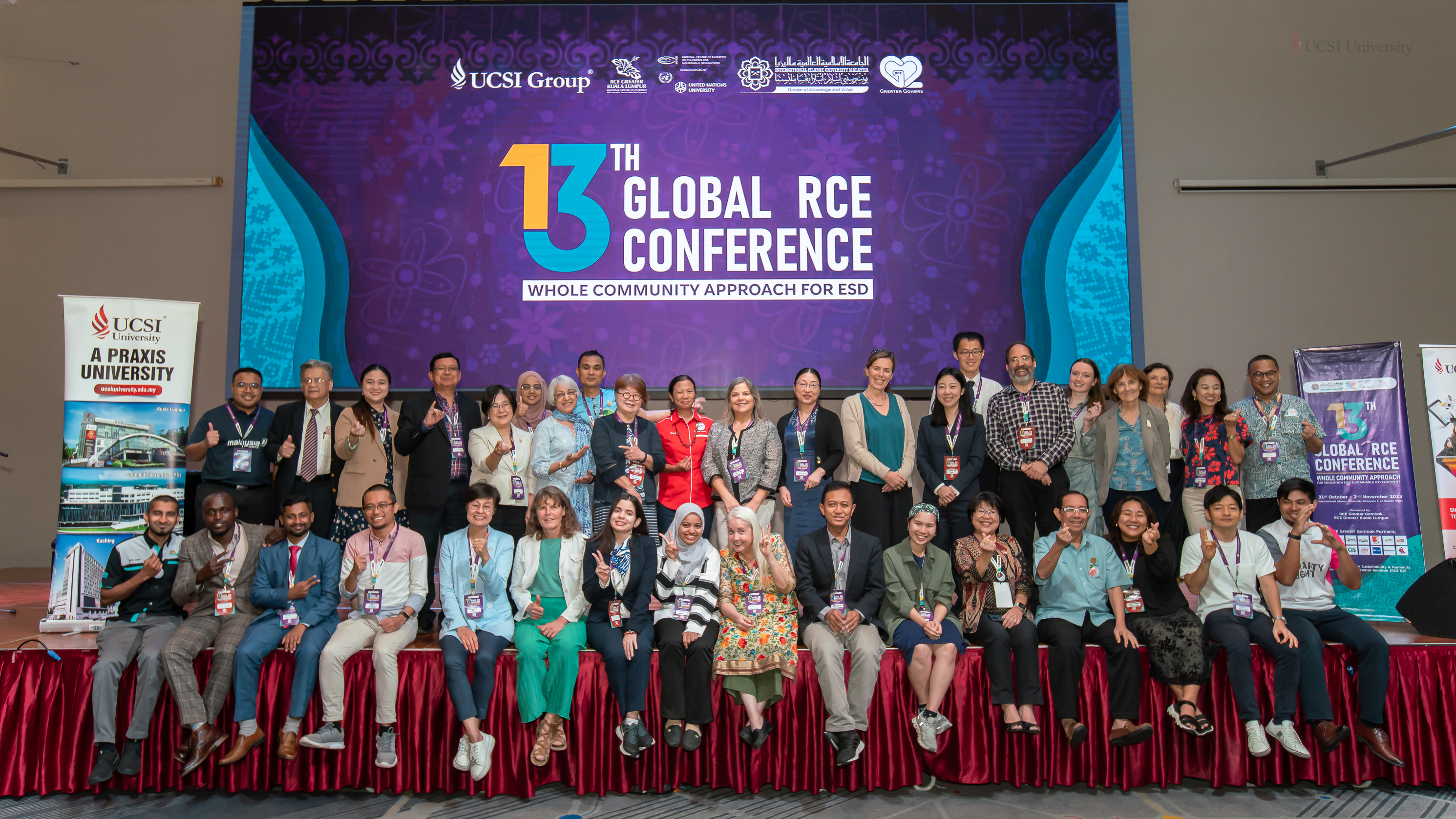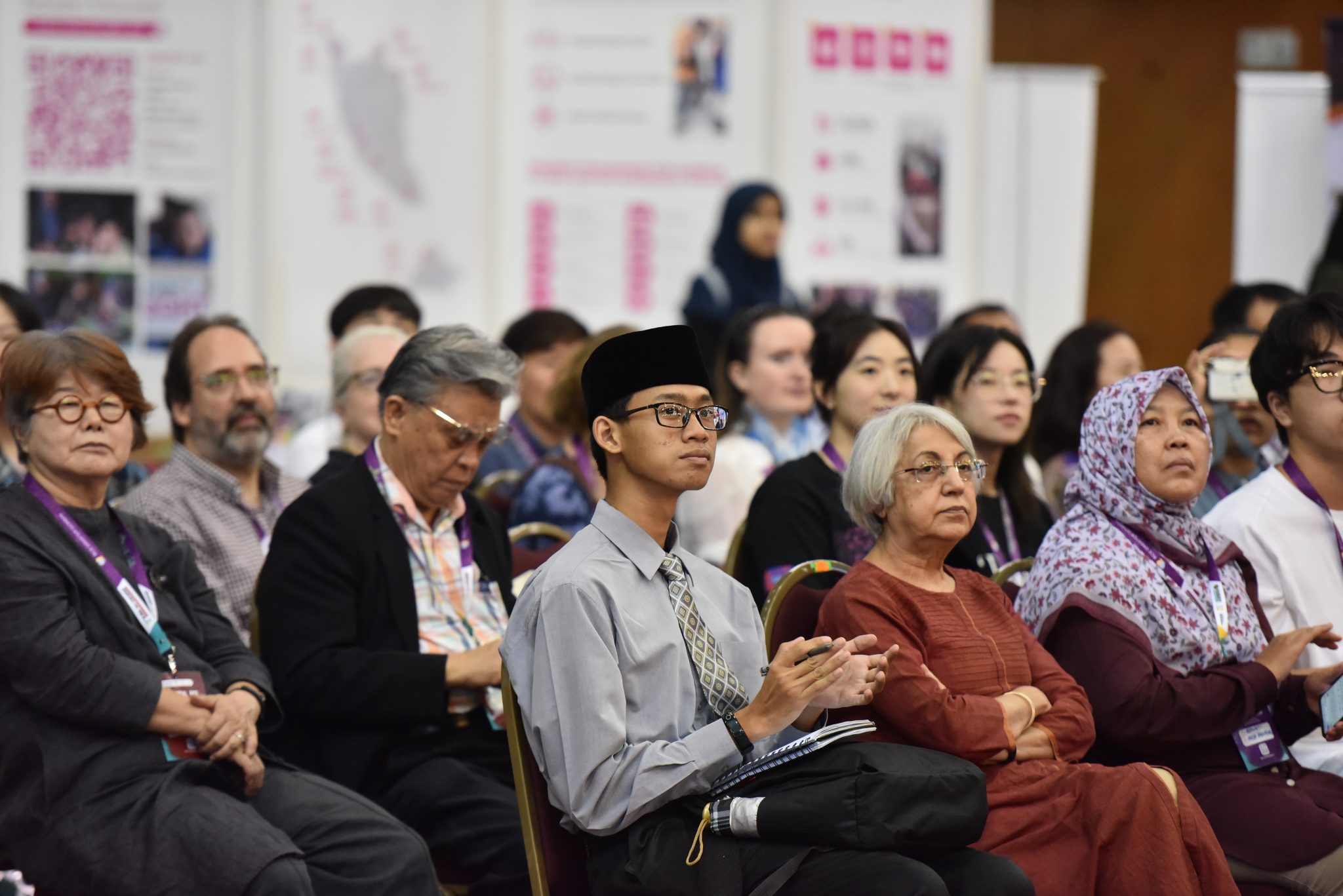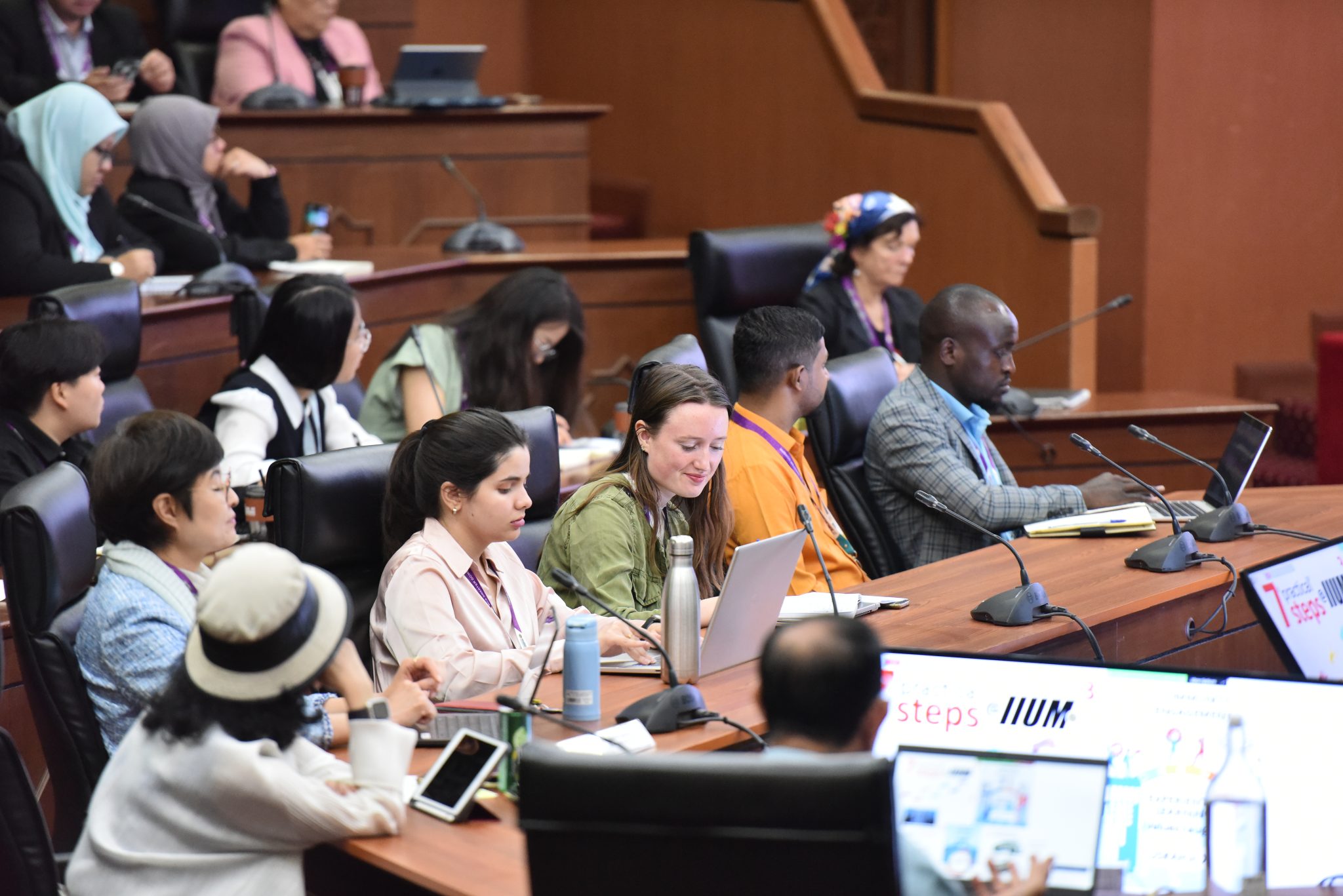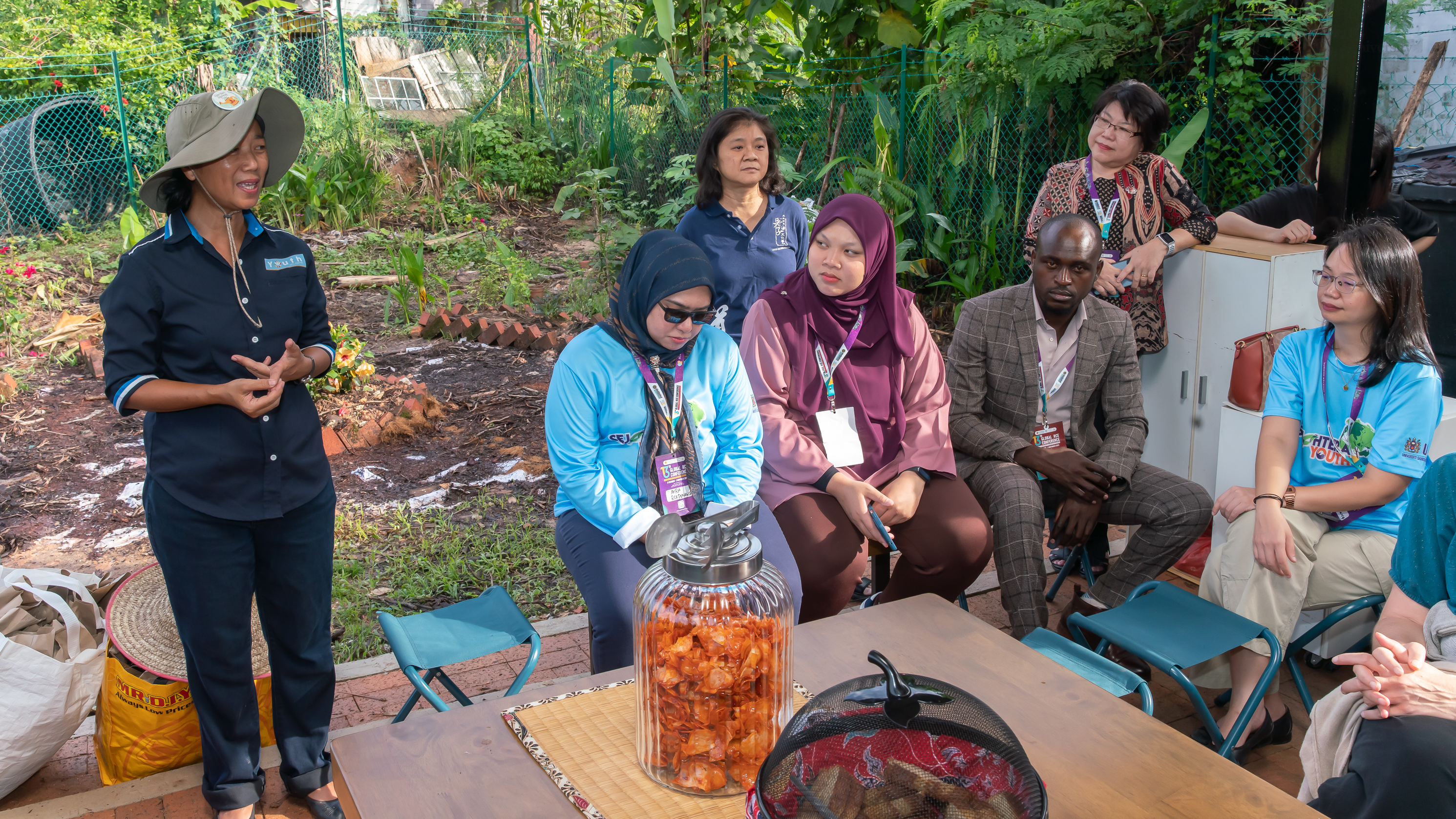13th Global RCE Conference Highlights Whole Community Approach for ESD
(Report by RCE Greater Gombak, edits by Global RCE Service Centre)

Overview
- The 13th Global RCE Conference was held from 31 October to 2 November 2023 in Kuala Lumpur, Malaysia, co-hosted by RCE Greater Gombak and RCE Greater Kuala Lumpur, under the theme 'Whole Community Approach for Education for Sustainable Development (ESD)'.
- Participants visited a number of Real World Labs to witness first-hand the whole community approach in action.
- A keynote by Prof. Emeritus Tan Sri Dzulkifli Abdul Razak, Rector of IIUM and co-chair of RCE Greater Gombak, outlined seven practical steps for the whole community approach in embedding the SDGs.
- Panel discussions focused on transformative learning, partnership and global movement, capacity building and empowering youth for the whole community approach.
The 13th Global RCE Conference was held from 31 October to 2 November 2023 in Kuala Lumpur, Malaysia, co-hosted by RCE Greater Gombak and RCE Greater Kuala Lumpur, under the theme 'Whole Community Approach for Education for Sustainable Development (ESD)'.
The three-day conference highlighted the importance of adopting a whole community approach, which involves collaborations among various stakeholders such as the education, government, and industry sectors, together with members of the community in advancing ESD. Joining the event were 165 in-person participants, along with 41 online participants, representing 43 RCEs from 39 countries.
On the first day, participants visited two Real World Labs: (1) Women Development Community Centre (PSPK) in Selayang, Selangor; and (2) Akar Budi Centre (ABC) in Gombak, Selangor, and witnessed first-hand the whole community approach in action. PSPK provides services and taps different resources that are available for marginalised women and children through welfare aid assistance and non-government resources, while ABC is a community centre that provides holistic support for the community in Sungai Pusu, adjacent to IIUM Gombak Campus. A Communiversity Symposium was organised at the IIUM Cultural Centre (ICC) where participants saw various community engagement projects by RCE Greater Gombak and partners (including IIUM staff and students) being displayed and presented. The Agent of Change Towards Sustainability (ACTS) Book was launched by the CEO of MAIPs and witnessed by Dr. Jonghwi Park (Programme Head, Innovation and Education Programme, UNU-IAS).
In his keynote speech on the second day of the conference, Prof. Emeritus Tan Sri Dzulkifli Abdul Razak, Rector of IIUM and co-chair of RCE Greater Gombak, outlined seven practical steps for the whole community approach in embedding the SDGs. He noted these were the steps taken at IIUM to embed SDGs, and that the whole process was an ‘experimentation’ that others could perhaps learn from. The seven steps were: (1) breaking silos – encouraging working together transcending disciplines to achieve IIUM’s mission of bringing about betterment for human life and civilisation; (2) creating a common platform through the SDGs flagships at IIUM; (3) engaging the community – from the hand to the head to the heart in transforming the community; (4) introducing experiential learning – beyond the classroom and theories / Usrah in Action; (5) developing edu-action programmes which promote flexibility, empowerment, innovation and accountability; (6) humanising education through the IIUM roadmap to instill sympathy, empathy and compassion – bringing back the heart to education; and (7) creating a new learning ecosystem with emphasis on community engagement. He stressed that co-learning, collaborating, co-creating and co-existing underlie the concept of Communiversity where the community and university come together to initiate transformation.
 Four panel discussions were convened to deliberate on transformative learning, partnership and global movement, capacity building and empowering youth for the whole community approach.
Four panel discussions were convened to deliberate on transformative learning, partnership and global movement, capacity building and empowering youth for the whole community approach.
In the first panel discussion, the speakers focused on transformative learning through a whole-community approach in the hopes to empower learners to become change agents. Professor Charles Hopkins (UNESCO Chair in Reorienting Education towards Sustainability, York University, Canada) advocated for the localisation of the SDGs beyond the 17 thematic areas and to enhance the transformation of education systems toward holistic approaches. Ms. Jana Dlouhá (COPERNICUS Alliance) addressed suitable approaches to equip learners with the competencies needed to live meaningful lives in yet uncertain futures, making responsible decisions for themselves but also in consideration of the values of the community. Dr. Shengru Li (Research Fellow, UNU-IAS) focused on action-oriented pedagogies building on the transformative approach and presented new research that shows a considerable number of RCEs focusing on environmental themes. Professor Dr. Zainal Abidin Sanusi (RCE Greater Gombak) proposed COMMUNIVERSITY as the new model for universities in prioritising service to the community, and highlighted that members of the university could become key actors to help facilitate this transition to sustainable ways of life and towards a culture of lifelong learning.
In the second panel discussion, Dr. Roger Petry (Regional Advisor to the RCE Community, Americas) deliberated on how global ESD movements and lasting partnerships can be developed. He argued that the whole institution approach could link research with education and operational activities which would engage students and not confine their learning to the classroom. Dr. Park Eyun-Kyung (Regional Advisor to the RCE Community, Asia-Pacific) provided an overview of how RCE Tongyeong partnered with various stakeholders to affect community transformation. The Sejahtera Forest opened in 2015 is considered as a ‘playground’ to easily learn sustainable lifestyles through experiences. Ms. Anita Ahmad (CEO, MySDG Foundation) addressed the challenge of financing SDGs initiatives and presented how Malaysia overcame this challenge through pooled financing via the Malaysia-UN SDG Trust Fund 2030 involving various ministries, UNDP and UNCT, and AVPN – a social investment network which brings together different companies to contribute into pooled funds for different areas of need in Asia.
 The third panel discussion saw Dr. Kiran Banga Chhokar (Regional Advisor to the RCE Community, Asia-Pacific) explain how RCE Pune built capacity for participatory budgeting which were faced with many challenges. Dr. Betsy King (Regional Advisor to the RCE Community, Europe) explained how RCE Scotland was involved in the national strategic approach of Learning for Sustainability (LFS). Ms. Julia Heiss (Team Leader, ESD for 2030, UNESCO) spoke about ESD for 2030 which aims to build a more just and sustainable world through strengthening ESD and contributing to the achievement of the 17 SDGs. She highlighted the examples of the UNESCO Global Network for Learning Cities involving 300 small to large cities, and the Sustainability Starts with Teachers programme aimed at capacity building for educators. Ms. Karen Chand (Director of Education Studies, SDSN, Asia Headquarters) spoke about the Sustainability Development Solutions Network (SDSN) which aims at accelerating the achievement of target 7 of SDG 4. The pilot project embarked by SDSN identified ways to embed ESD and Global Citizenship Education (GCED) into the Malaysian primary and secondary curriculums and found that teachers receive insufficient training in ESD, due to limited support from school leaders and the school ecosystem. While the attention has always been on content and outcomes of ESD, there is a dire need to address capacity building and provide support for teachers.
The third panel discussion saw Dr. Kiran Banga Chhokar (Regional Advisor to the RCE Community, Asia-Pacific) explain how RCE Pune built capacity for participatory budgeting which were faced with many challenges. Dr. Betsy King (Regional Advisor to the RCE Community, Europe) explained how RCE Scotland was involved in the national strategic approach of Learning for Sustainability (LFS). Ms. Julia Heiss (Team Leader, ESD for 2030, UNESCO) spoke about ESD for 2030 which aims to build a more just and sustainable world through strengthening ESD and contributing to the achievement of the 17 SDGs. She highlighted the examples of the UNESCO Global Network for Learning Cities involving 300 small to large cities, and the Sustainability Starts with Teachers programme aimed at capacity building for educators. Ms. Karen Chand (Director of Education Studies, SDSN, Asia Headquarters) spoke about the Sustainability Development Solutions Network (SDSN) which aims at accelerating the achievement of target 7 of SDG 4. The pilot project embarked by SDSN identified ways to embed ESD and Global Citizenship Education (GCED) into the Malaysian primary and secondary curriculums and found that teachers receive insufficient training in ESD, due to limited support from school leaders and the school ecosystem. While the attention has always been on content and outcomes of ESD, there is a dire need to address capacity building and provide support for teachers.
In the last panel discussion, Ms. Jyuri Michino (Programme Assistant and Youth Focal Point, UNU-IAS) addressed the overall importance of including youth in discussions on sustainable development and the potential for fruitful conversations and potential for implementation when creating youth ownership. Mr. Evance Ouya (RCE Regional Youth Coordinator, Africa) presented efforts in Kenya with a focus on forestry and sustainable agriculture as an example to offer environmental education to children at an early age. Ms. Young Ran Hur (United Nations Environment Programme - UNEP, Asia-Pacific Office) gave a brief overview of the Children and Youth Stakeholder Mechanism, as one out of 15 major groups within the UN system. Ms. Oriana Silva (RCE Regional Youth Coordinator, America) addressed her efforts in building a strong youth network in the RCE Americas region that allows diverse voices to be part of the discussion in inclusive and equitable ways.
During breaks, participants were presented with dikir barat, a unique musical art form that involves a combination of singing, poetry recitation, rhythmic dancing and music, and wayang kulit or shadow puppetry, a traditional form of theatre that uses light and shadow in which carved skin puppets are projected on a screen. The performers were students from the Rohingya Education Centre (Rohingyas), Jasmine Ash-Sham Alternative Education Centre (Syrians and Somalis) and Setiabudi Primary School (Malaysians).
 The third day of the conference was held at UCSI University. The day began with a visit to Garden Spring, a gardening community in Cheras, Kuala Lumpur. Prof. Emeritus Tan Sri Dr. Zakri Abdul Hamid (Founding Director and Distinguished Professor, International Institute of Science Diplomacy and Sustainability, UCSI) delivered the second keynote speech in which he reminisced on the establishment of RCEs. The origins of RCEs can be traced back to the UN World Summit on Sustainable Development in Johannesburg, South Africa in 2002 in which the Ubuntu Declaration was signed. The declaration suggested for greater global emphasis on education which is essential to reaching SDGs and creating a major global alliance to promote science and technology courses and teaching throughout educational systems. The core elements of RCE are governance, collaboration, research and development, and transformative education. ESD in RCE aims at re-orientating education towards SD, by integrating SD and ESD into the current curriculum and tailoring it to address issues and local contexts of the community in which they operate.
The third day of the conference was held at UCSI University. The day began with a visit to Garden Spring, a gardening community in Cheras, Kuala Lumpur. Prof. Emeritus Tan Sri Dr. Zakri Abdul Hamid (Founding Director and Distinguished Professor, International Institute of Science Diplomacy and Sustainability, UCSI) delivered the second keynote speech in which he reminisced on the establishment of RCEs. The origins of RCEs can be traced back to the UN World Summit on Sustainable Development in Johannesburg, South Africa in 2002 in which the Ubuntu Declaration was signed. The declaration suggested for greater global emphasis on education which is essential to reaching SDGs and creating a major global alliance to promote science and technology courses and teaching throughout educational systems. The core elements of RCE are governance, collaboration, research and development, and transformative education. ESD in RCE aims at re-orientating education towards SD, by integrating SD and ESD into the current curriculum and tailoring it to address issues and local contexts of the community in which they operate.
During Day Three of the conference, two parallel sessions were held. The first session served as an avenue to share good practices of local actions on mainstreaming the whole community approach for ESD. The RCEs presented their respective initiatives in relation to transformative learning, partnership and global movement, capacity building and youth empowerment vis-à-vis the whole community approach. In the second session, RCEs were divided by regions – Asia-Pacific, Africa, Europe and Americas – to share best practices, identify common and specific issues and find ways to enhance collaboration with one another. It was discovered that each region would have certain common issues that can be addressed collaboratively.
In conjunction with this conference, RCE Greater Gombak also organised the RCE Youth Empowerment Workshop on 3 November 2023, which saw the gathering of RCE youth leaders (Youth Focal Point, UNU-IAS, Asia Pacific RCE Regional Youth Coordinator, RCE Greater Gombak Youth and UNITE- Indonesian based youth organisation) coming together to collaborate and establish international networks for the purpose of ESD.
The Global RCE Service Centre would like to thank the teams at RCE Greater Gombak and RCE Kuala Lumpur for their dedication, tireless efforts, and superb organisation and hosting of the 13th Global RCE Conference. Acknowledgement must also go to the attendees from across the RCE community for their active participation, which combined, made the event a great success.
For more information and to access resources from the 13th Global RCE Conference, visit the event page here.
(Photo copyright: UCSI University and RCE Greater Gombak)


